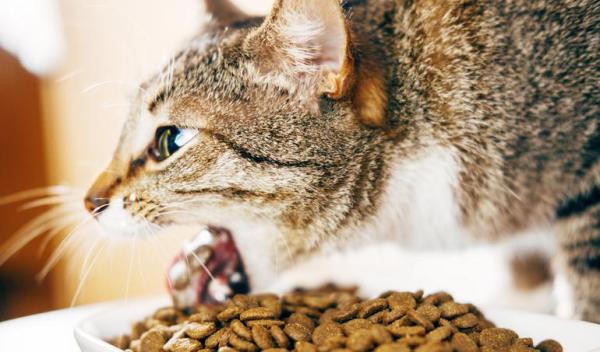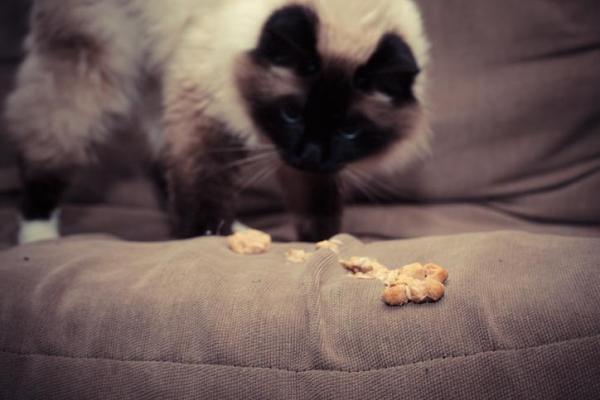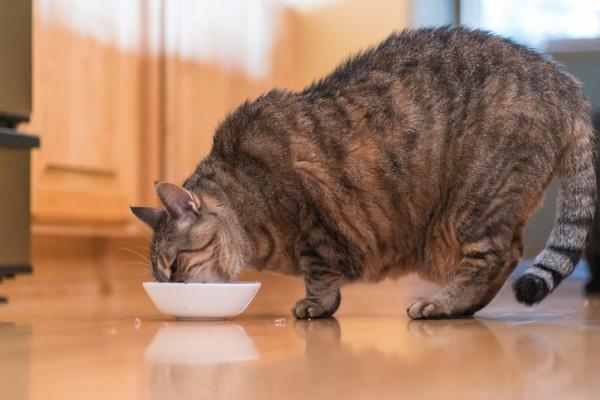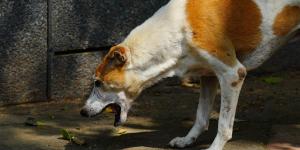Why Does My Cat Vomit After Eating?



See files for Cats
Sporadic vomiting in cats is common. However, if your cat is vomiting weekly or daily, there is cause for concern. Frequent vomiting in cats can be a symptom of several types of disease. To have a better chance of diagnosing the specific problem, we need to look at the context of the vomiting. This means we should look at the consistency and color of the vomit, as well as the actions of the cat before, during and after they throw up. The fact a cat vomits after eating can help us to determine the reasons for their digestive upset.
Vomiting in cats almost always requires veterinary consultation. AnimalWised asks why does my cat vomit after eating? We look at the possible reasons a cat throws up after eating their food and what we can do about it as caregivers.
Why does my cat vomit right after eating?
Before explaining why your cat throws up after eating, we need to differentiate between vomiting in cats and regurgitation in cats. When a cat regurgitates food, it is expelled through their mouth before it has time to enter the stomach. It does not require much effort and usually stops immediately after the food leaves the mouth. Vomiting is a violent expulsion of at-least-partly digested food from the stomach.
While cats should not regurgitate food regularly, it is usually not a cause for concern if it happens sporadically. Vomiting is usually a more violent action which can be the result of various gastrointestinal issues. Whether these digestive problems are acute or chronic, we should determine their origin[1].
Vomiting in cats may be due to intestinal inflammation, tumors, hairballs, parasites, ulcers, foreign bodies, intoxication, disease or many other factors. The possible causes can be detrimental to a feline’s health which is why an accurate diagnosis is necessary. If your cat is vomiting after eating, a veterinarian will likely perform blood tests, an ultrasound and abdominal radiographs to find out the cause of the problem.
When a cat vomits after food, it often means they cannot hold the food down. Something is preventing them from maintaining the contents of their stomach. In the next sections, we look at the main reasons cats vomit after eating in more detail.
As we stated in the introduction, we also need to look at the context of the vomiting. Learn more with our article on why a cat is vomiting white foam.
Digestive blockage
The type of food a cat eats will affect their ability to hold it down. If a cat vomits after eating dry food, we should look at its consistency. Since dry food does not contain much moisture, the cat may have some difficulty swallowing it. This is particularly the case in older cats which are more prone to digestive issues. If we see the dry kibble is almost entirely intact, it may mean the cat has trouble swallowing.
One reason a cat cannot swallow easily is due to a blockage. This can be due to a number of reasons, including:
- Hairballs: when a cat grooms themselves, they often ingest dead hair. Small amounts of hair will past through their digestive system and will be excreted with feces. When the cat ingests a large amount, they form trichobezoars, i.e. hairballs in cats. This can cause blockages in various parts of the gastrointestinal tract and even cause food to be returned through their mouth.
- Tumors: tumors are made from an over-proliferation of cells which cause a mass to form. This can block a part of the digestive tract and prevent the cat from being able to hold down food, so they throw up after eating.
- Foreign object: if a cat swallows something indigestible, the foreign object cannot be broken down. This results in food being brought back up as ti cannot pass the obstruction. We may see other signs such as the cat making choking noises. We should not try to remove the object ourselves, but take them to a veterinarian for a scan or radiography.
- Inflammation: if a part of the GI tract is inflamed, it can prevent food from passing through. This inflammation can be due to various reasons which we explain in the rest of this article.
Certain factors can increase the likelihood of a cat developing hairballs. Longhaired cats have more hair to ingest, so it is important we also groom them by brushing regularly. Some cats may also overgroom themselves due to stress or other factors. In these cases, we should be observant for the possible presence of hairballs.
Gastrointestinal disease
Gastrointestinal disease in cats can cause your cat to vomit undigested food long after eating. In some cases, cats suffering from this problem will only vomit gastric juices. This is because the cat’s stomach is not able to function at its normal level. In addition, the cat’s stomach is not able to empty its contents correctly, which explains why your cat will vomit after eating.
Gastric retention syndrome in cats can occur due to an injury, or a primary or secondary motor disorder. The presence of hairballs can also trigger this syndrome. In addition to finding and treating the cause, you should make sure your vomiting cat is fed a diet rich in fiber, as this facilitates digestion. In more serious cases, surgical intervention may be required.
The cause of the digestive disease can be due to various pathologies, whether viral, bacterial or even fungal[2]. These can often lead to gastritis in cats. This is the inflammation of the gastric mucosa, i.e. the lining of the gastrointestinal system. When this occurs, food cannot travel properly and the nutrients are improperly absorbed into the blood. This is a serious problem and requires diagnosis by a veterinarian.
Learn more with our article on gastritis in cats.

Parasites
Certain internal parasites in cats can cause gastrointestinal upset. They won't always cause the cat to throw up after eating, but it can be a reason for this behavior. When the parasites collect in the intestines or other parts of the digestive system, the cat cannot properly absorb their nutrients. This can result in various symptoms in addition to vomiting, including diarrhea and pain.
Learn more with our article on intestinal parasites in cats.
Eating too fast
Another reason your cat throws up after eating could be due to overeating or eating too fast. When a cat overeats too quickly their stomach becomes overloaded and is unable to function properly. The result is the cat vomiting undigested food right after eating.
One of the most common reasons a cat eats too fast is due to insecurity. If a cat thinks their food is going to be taken away, they will often eat quickly to try to ensure they get the nutrition they require. This feeling of insecurity can be due to many reasons. One of the most important is if there are other cats in the home. If another cat eats your cat's food, they may eat quickly to prevent them from doing so.
Another issue is to do with feeding schedules. As cats are creatures of routine, it is important we feed cats regularly and consistently. If we feed cats at different times during the day or even skip feedings, the cat may worry about where their next meal will come from. In these cases, they may eat too much and vomit it afterwards. It is important we be consistent and provide reassurance for the cat and their feeding.

Stress
Related to eating too fast, stress eating can cause the cat to vomit after ingesting their food. There are various reasons for stress in a cat's life. These are often related to changes in the home. If we have a new family member, the home becomes noisy or there is any stimuli which makes the cat feel insecure, they can become stressed. Stress can have various effects on the cat, including making them vomit after eating.
Stress can also be a result of poor socialization, trauma or other negative experiences. Often, if we address the root cause of the cat's stress, we will find they are better able to cope and may stop throwing up after eating.
It is vitally important we take a cat to the veterinarian to determine whether there is a physical reason our cat throws up after eating. If such a physiological issue is ruled out, we should speak to a feline ethologist who can help us assess their emotional well-being and provide practical tips to address their issue.

This article is purely informative. AnimalWised does not have the authority to prescribe any veterinary treatment or create a diagnosis. We invite you to take your pet to the veterinarian if they are suffering from any condition or pain.
If you want to read similar articles to Why Does My Cat Vomit After Eating?, we recommend you visit our Intestinal problems category.
1. Huang-Kornic, E. (1999). Chronic intermittent vomiting in a cat: a case of chronic lymphocytic-plasmacytic gastritis. Can Vet J., 40(3), 196–198.
https://www.ncbi.nlm.nih.gov/pmc/articles/PMC1539676/
2. Esteves, M. I., et al. (2000). Helicobacter pylori Gastritis in Cats with Long-Term Natural Infection as a Model of Human Disease. Am J Pathol., 156(2), 709–721.
https://www.ncbi.nlm.nih.gov/pmc/articles/PMC1850051/








